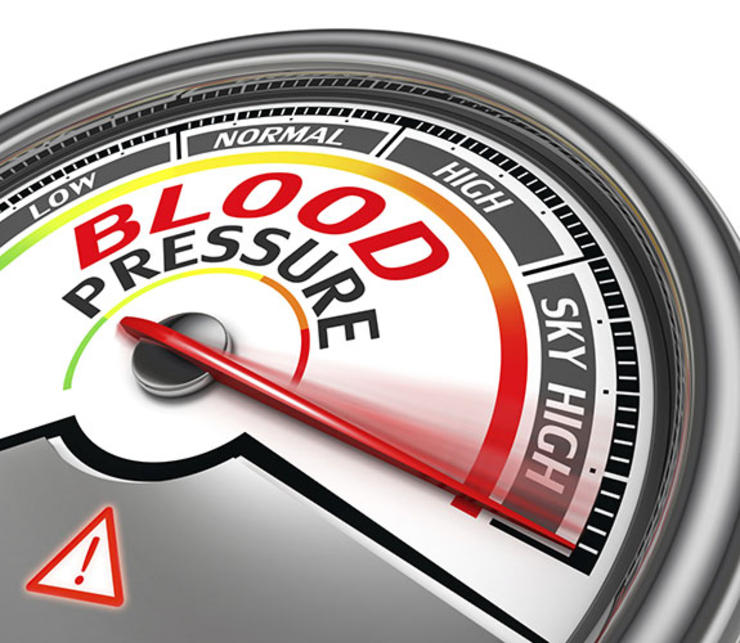Hitting pause on your workout plan can do more than just make you paunchy
Just as a good training program builds you up, falling off the workout wagon can have the opposite effect—sometimes almost immediately.
Experts call this phenomenon “detraining,” and its consequences can weigh even heavier than the gut you see in the mirror. Fortunately, the condition is fully reversible, as long as you get your butt back to the gym.
Here’s what happens when you swap your regular sweat sessions for never-ending Netflix nights—and how long it takes to re-flip the fitness switch.
1. YOUR BLOOD PRESSURE SOARS
This effect is near-instant: Your blood pressure is higher on the days you don’t exercise than the days you do. Your blood vessels adapt to the slower flow of a sedentary lifestyle after just 2 weeks, which clicks your readings up another couple of notches, according to a recent study in the journal PLoS.
Within a month, stiffening arteries and veins send your BP back to where it would be if you’d never even left the couch, says study author Linda Pescatello, Ph.D., of the University of Connecticut.
Reverse it: The whole scenario unfolds backward when you start sweating again. Your blood pressure drops a bit that day and your blood vessels begin to function more efficiently within a week.
After a month or two, the stress from heart-pumping workouts makes your vasculature more flexible, causing lasting pressure-lowering effects, Pescatello says.
2. YOUR BLOOD SUGAR SPIKES
Normally, your blood glucose rises after you eat, then drops as your muscles and other tissues suck up the sugar they need for energy. But after 5 days of slothfulness, your post-meal blood sugar levels remain elevated instead, according to a recent study in the journal Medicine & Science in Sports & Exercise.
If you stay sedentary, continuously creeping glucose readings can raise your risk of heart disease and diabetes, says study coauthor James Thyfault, Ph.D., of the University of Missouri.
Reverse it: Just 1 week of regular exercise dramatically drops post-meal blood sugar, even in people who already have type 2 diabetes, Thyfault says.
3. YOU GET WINDED FAST
Gasping for breath after just a few stairs?
Within 2 weeks of avoiding the gym, your VO2 max—a measure of fitness that assesses how much oxygen your working muscles can use—decreases by as much as 20 percent, says exercise physiologist Stacy Sims, Ph.D, M.Sc.
What’s more, if you recently started a workout plan—like as a New Year’s Resolution—your fitness gains could actually evaporate completely, notes Nikolaos Koundourakis, Ph.D., of the University of Crete.
One reason: You lose mitochondria, or the mini-factories within your muscle cells that convert that oxygen into energy. In fact, in a recent British study, 2 weeks of immobilization decreased muscle mitochondrial content as much as 6 weeks of endurance training increased it.
Reverse it: You can rebuild those mitochondria, but it’ll take you longer than it did to lose them. That’s probably because even active people only exercise for a portion of the day. Staying sedentary, on the other hand, is a 24-hour pursuit, says study author Martin Gram, Ph.D., of the University of Copenhagen.
The good news? It’s never too late to re-start an exercise habit to Get Back in Shape. In the same study, older men gained fitness almost as easily as those 45 years younger did, Gram points out.
4. YOUR MUSCLES WITHER
Gram’s study also found significant declines in muscle mass after 2 weeks of complete rest. What’s more, some muscle fibers actually convert from fastest-twitch type IIa to more explosive but faster-fatiguing type IIx. This can hamper your ability to sustain high-intensity efforts, Sims says.
Reverse it: You’ll need longer to rebuild your muscle mass than it took you to lose it, but less time than it would take someone who has never picked up a dumbbell in his life.
As for those fast-twitch fibers? About 10 weeks of 3 weekly strength-training sessions increased the total volume of fast-twitch fibers by 22 percent, as well as the ratio of type IIa to type IIx, found a recent paper in the journal Human Movement Science.
5. YOU PLUMP UP
Within about a week, your muscles lose some of their fat-burning potential and your metabolism slows down, says Paul Arciero, D.P.E., an exercise science professor at Skidmore College. In findings he published in the Journal of Strength & Conditioning Research, a 5-week exercise break boosted collegiate swimmers’ fat mass by 12 percent.
In another study, Koundourakis found super-fit, already-ripped pro soccer players gained a percentage point of body fat after taking 6 weeks off. (Though they didn’t report how much less likely they’d be to rip off their jerseys after scoring a goal.)
Reverse it: Double the length of your break—you may need at least that long to reach the same level of lean. But if you can manage to squeeze in just one workout a week instead of completely laying off, you’ll maintain some fitness and fast-forward the process of getting your old body back, Arciero says.
6. YOUR BRAIN SUFFERS
Just 2 weeks on the sidelines turned regular exercisers tired and grumpy, found a recent study in the journal Brain, Behavior, and Immunity.
And though human evidence is limited, rat studies presented at a recent Society for Neuroscience conference suggest animals that stop moving for just a week grow fewer new brain cells and do worse on maze tests than those who stick to a steady wheel-running routine.
Reverse it: Exercise Can Fight Depression—it produces a near-instant mood lift, even for people who struggle with the disorder, found recent research in the journal Abnormal Psychology.
Plus, regular, moderate movement helped older adults grow a larger hippocampus—a key brain area for memory—within a year, says Kirk Erickson, Ph.D., a University of Pittsburgh researcher. And there’s some evidence that the fitter you were before a break, the swifter your brain gains will be.
Original article found on Men’s Health http://www.menshealth.com/health/effects-of-stopping-exercise/slide/7




